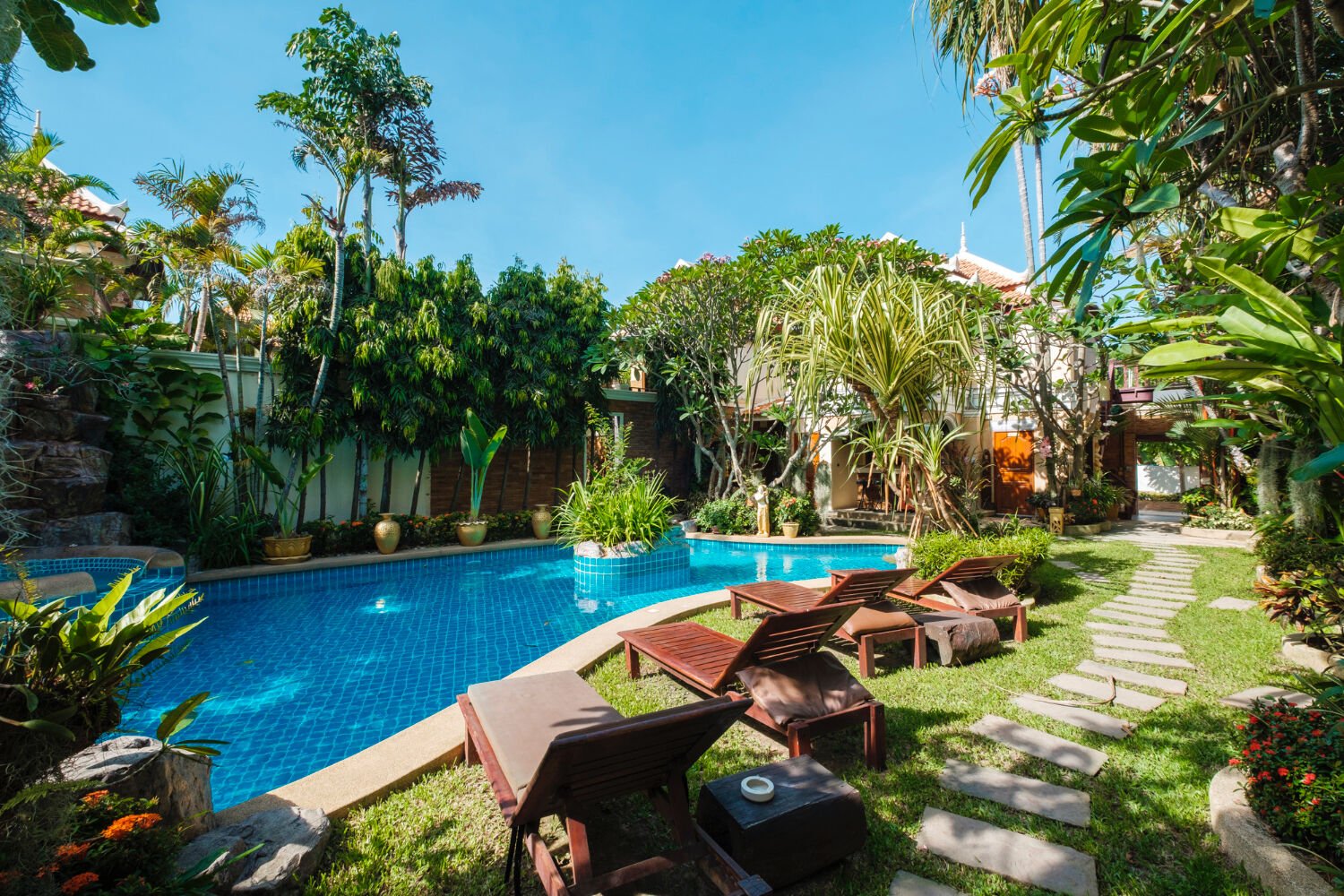Can foreigners buy property in Thailand? A comprehensive guide

Thailand has more than its vibrant street food and bustling city life that captivates the hearts of many foreigners. The possibility of a permanent stay becomes quite appealing, which begs the question – can foreigners buy property in Thailand?
Buying property in Thailand as a foreigner can be tricky. But don’t worry. In this guide, we’ll give you all the info you need to confidently tackle the Thai property market.
How does Thailand’s property law apply to foreigners?

Before you decide to spend your hard-earned savings on a beautiful beachfront property, it’s crucial to understand Thailand’s property laws. These rules can prevent you from getting into challenging situations later on.
So, can foreigners buy property in Thailand? Well, yes and no. If you’re not Thai, you can’t buy land in Thailand. The laws are clear and prevent foreigners from owning land in the country. There are, however, ways you can legally own property in Thailand. These include:
1. Purchasing a condo
Luckily, if you’re keen on buying a property in Thailand, the country’s law, specifically the 1979 Thai Condominium Act, allows foreigners to buy condominiums. Condominiums are found in many locations throughout the country and come in various price ranges, which means finding one to suit your personal needs and financial capacity should be a walk in the park.
One thing you need to keep in mind is that foreigners can’t own more than 49% of all sellable units in any given building or compound.
If you’re looking to buy a used condo from a Thai citizen, make sure to check with the property management office. They’ll let you know if the building already has too many foreign owners.
2. Securing a leasehold
What about owning a beautiful Thai villa or a big property? In this case, your only option is to lease. You can apply for long-term land leases and build structures on the land. This essentially allows you to own a villa, townhouse, or any property really, on Thai soil without actually holding the land deeds in your name. So, you have the joy of living in your dream Thai home with a slight catch – the land it sits on isn’t technically yours.
Your lease can last up to 30 years and can be renewed twice, pushing your leasehold period to a maximum of 90 years. However, remember that renewing the lease isn’t always a walk in the park. The owner, or their heirs, can turn down your request for an extension.
To avoid stepping into this potential pitfall, it’s important to jot down every single detail and agreement when you sign the leasehold contract. This can save you from future trouble and brick walls of miscommunication.
Are there any alternatives to buying land in Thailand as a foreigner?

Yes, there are a few alternatives you can consider, but they can be more complicated. These include:
1. Setting up a Thai company
If you’re setting your sights on owning property in Thailand, one way to do so is by setting up a Thai Limited Company. But remember, this option comes with its own set of rules.
Firstly, the company’s ownership needs to be split between Thai nationals and foreigners, with Thais holding 51% of the shares. As a foreigner, you’d be allowed to own up to 49% of the shares.
Moreover, your company can’t just exist on paper. To be accepted by the law, your company must be a working business that makes money and includes real Thai investors.
After you’ve set up your company properly, you can use it to buy land or property in Thailand. Because this process can be complex, it’s a good idea to hire a Thai lawyer to guide you through.
2. Investing through the BOI
If you’re a foreigner looking to invest or advance a business in Thailand, the Board of Investment (BOI) might extend certain benefits and permissions your way. One such privilege could be the ability to buy residential land for housing your employees. However, the investment must benefit Thailand’s economy, such as being made in assets or bonds.
Bear in mind this isn’t a simple handover. It might require a thumbs-up from the Ministry of Interior before these privileges are given to foreign investors. Also, it’s important to note that these privileges don’t extend beyond your lifetime. In other words, your heirs can’t inherit the property ownership.
3. Become a permanent resident
If you’re thinking of staying in Thailand for good, it might be a good idea to become a permanent resident. Becoming a permanent resident can offer more choices. Not only can you live indefinitely in Thailand without the need for stay extension applications, but you can also have your name on a house registration document. Furthermore, as a permanent resident, you have the ability to purchase a condominium without making any bank transfers from overseas. This status also enhances the likelihood of getting approved for mortgage financing.
4. Getting married to a Thai national
Another option on the table is marrying a Thai national. However, even if you tie the knot, owning land won’t just fall into your lap. Your Thai partner will need to prove that the money used to purchase the land was entirely theirs.
In effect, the purchased property would be registered under the Thai spouse’s name, even if you (as the foreign partner) were the one to buy it. You’re prohibited from jointly owning the property with your spouse, so it can’t become a shared marital asset. The Land Department also requires a signed declaration from the couple stating that the money used to buy the property was solely owned by the Thai spouse. Moreover, after marrying a non-Thai citizen, a Thai national faces limitations regarding future land acquisitions.
However, let’s tread gently here. It’s not suitable to rush into marriage with a Thai national simply with the intention of buying land. Consider all your options and potential consequences before making a big decision, like marrying to buy land.
Each choice has good and bad points. So, before you decide what to do, make sure to check everything out carefully and ask for professional advice. It’s always best to make sure you’re following the rules when you’re in a different country.
How to navigate the property market in Thailand

Thailand’s property market is attractive. But understanding its walkways and shortcuts is crucial before making any investment decisions.
1. Market trends
In recent years, the real estate landscape of Thailand has been shifting dynamically. Despite challenges, such as the Covid-19 pandemic, global economic uncertainties, and slower domestic economic growth, the market chugs along. An emerging trend is the rise in demand for condominiums, particularly in urban areas, where space is at a premium. This has been driven significantly by both local and foreign buyers seeking homes or potential rental returns.
2. Potentially profitable regions for investment
When considering property investment in Thailand, certain regions show greater promise than others.
Bangkok, the heart of the nation, is a prime spot. Its status as a commercial centre provides a continually growing demand for both high-end and affordable living spaces.
Phuket and Koh Samui are also catching the eyes of investors. Their stunning beachside resorts have become incredible tourist hotspots, making them fitting for holiday homes or property investments.
Moreover, locations like Chiang Mai and Pattaya are gaining popularity. Chiang Mai, with its blend of modern conveniences and rich heritage, attracts expats, while Pattaya’s bustling beach resort atmosphere draws both young people and families.
3. Finding a property in Thailand
If you’re planning to buy property in Thailand but you’re currently living overseas, local estate agents can be a big help. They know the local market and will guide you through the buying process.
Still, be careful when choosing an agent. In Thailand, there are no strict rules about who can work as an estate agent. This means not all agents are experienced or reliable. To avoid problems, try to find an agent who comes recommended by people you trust. Don’t be shy about asking questions or doing some research on the agency yourself.
Starting your search online is another good idea. Before you come to Thailand, you can look at property listings on various Thai real estate websites, such as FazWaz. This is a handy way to see what’s on offer without leaving your home.
What do you need to consider before buying property in Thailand?

When venturing into the Thailand property market, it’s crucial to look beyond the attractive price tags. There are quite a few pivotal factors to consider.
1. Property taxes
Understanding the property tax rules in your home country can be tricky enough, let alone trying to grasp them in a foreign land. If you’re casting your eyes towards buying property in Thailand, it’s vital to familiarise yourself with the local tax landscape.
Thailand has several property taxes you need to be aware of. These include a transfer fee, stamp duty, a specific business tax (SBT), and an inheritance tax. All these taxes depend on factors such as the type of property, its value, and how long it’s been owned.
The price of a condo might or might not include these taxes, which can add up to a significant amount. So when you buy a property, especially a second-hand one, you might often find yourself footing the entire tax bill simply because it reduces the purchase price and, thus, the total taxes due.
When buying from a developer, the SBT, a 3.3% tax levied on the sale price if the property has been in the seller’s hands for fewer than five years, is usually covered by them. The other taxes are typically split 50/50.
If the property has been owned for more than five years, a stamp duty of 0.5% is applied instead of SBT. The transfer duty, another tax to keep in mind, accounts for 2% of the property value assessed by the Land Department.
Lastly, there’s the Withholding Tax. This is basically an advance on the seller’s income taxes. When you buy a condo from a developer or a company, this tax is set at 1% of the higher amount between the assessed value and sales price. The tax tends to be higher when buying from an individual, and it’s calculated based on the assessed value and the duration of the seller’s ownership. The tax is usually paid for the seller’s income tax liability. However, the buyer usually pays.
2. The long-term impact of property investment
Secondly, consider the long-term impact of your investment. Will the property value appreciate over time? Can the property generate a steady rental income? How will changes in government policy or economic conditions affect your investment?
3. Foreigners need to pay for the condo with foreign currency
Don’t forget that as a foreigner, you’re required to purchase your Thai condo with foreign currency. This has to be brought into Thailand and converted into Thai Baht within the country. This means that, in most cases, you won’t be able to use a mortgage to finance your purchase. For large currency exchanges, you’ll need to complete a Foreign Exchange Transaction Form (FETF). Keep these points in mind to avoid any financial hiccups.
4. Condition of the property
A crucial step often overlooked is due diligence. Every financial transaction in Thailand needs to be scrutinised to ensure it’s a worthy investment. This involves looking into the history of the property developer and talking to previous owners about their satisfaction with the property. These are the sort of checks an experienced real estate lawyer will do on your behalf.
5. Paying the deposit
If you’ve found the perfect property in Thailand, the first step is to pay a deposit. This deposit shows you’re serious and reserves the property for you. It’s common for property sellers and agents in Thailand to ask for a deposit, which is usually around 10-15% of the total price. This deposit is then taken off the final price.
The deposit works both ways. If you choose not to buy the property, the seller will keep the deposit. But if the seller doesn’t hold up their end of the deal, the deposit is returned to you.
However, it’s very important to make sure all these details are included in a written agreement and that you keep a receipt of your deposit payment. Also, remember that usually, unless there’s a special part in the agreement that allows you to get your deposit back if you decide not to buy the property, the deposit is non-refundable. So make sure you think over your decision carefully before you pay the deposit.
What are the most common challenges for foreign property buyers in Thailand?

As much as the Thai real estate market offers numerous attractive opportunities, it doesn’t come without its challenges, especially for foreign buyers. Here are two main obstacles that you may encounter:
1. Legal issues
Navigating the legalities of property ownership in Thailand as a foreign buyer can be quite complex. There are certain restrictions for foreigners, like not being able to directly own land. Sorting out these legalities usually requires the assistance of a knowledgeable lawyer to ensure you’re operating within the confines of the law.
2. Financial challenges
Financial hurdles also worth mentioning. Often, getting a mortgage or financing for a property in Thailand can be tricky for foreigners. Banks are usually hesitant to lend money to non-Thai nationals, and when they do, the process tends to be time-consuming and filled with red tape. Plus, since foreigners usually need to pay for the condo with foreign currency, getting a mortgage from a local bank can be difficult.
3. Language barrier
Having a grasp of the Thai language definitely helps when dealing with local sellers, agents, or lawyers. Language barriers can lead to miscommunications and misunderstandings.
4. Understanding the market
Thailand’s real estate market differs significantly from Western markets. From pricing and negotiating tactics to understanding return on investment, it can be challenging to grasp these local nuances.
5. Property maintenance
If you’re considering a property for investment purposes, managing it from overseas could pose a challenge. Finding reliable property managers or tenants often requires time and resources.
What are the steps for foreigners to buy property in Thailand?

Taking a leap into the Thai property market as a foreigner comes with its own set of challenges. With unfamiliar laws and an unregulated housing system, it’s easy to feel a bit on edge. However, with proper research and prudent decisions, it’s indeed safe and possible to buy property in Thailand. Here’s a quick guide to help you through the process:
1. Start with research
Take the time to understand Thailand’s real estate market, including the areas that interest you. Research the typical prices and look into various property styles. Online portals and real estate agencies can offer a wealth of information.
2. Legal advice
The biggest mistake you could potentially make is diving into the property market without an expert real estate lawyer. Although not legally required, having one greatly decreases the chances of unnecessary complications, delays, or, worst case scenario, unintentionally breaking Thai law. Therefore, it’s a wise step to engage an independent real estate lawyer before proceeding with any property purchase.
3. Property type
Consider the type of property you’re interested in. As a foreigner, you can own condominiums, but purchasing land directly is off the cards. However, you may lease land or employ other methods, like setting up a business, to work around these restrictions.
4. Location
Decide on where you want to buy. The best places include Bangkok for its bustling city life and variety of condos, Phuket and Koh Samui for its touristy beachside resorts, Chiang Mai for a balance of modern living and tranquil heritage sites, and Pattaya for its lively beach resort atmosphere.
5. Dealing with real estate agents
Finding the right property can be far more manageable with the help of a reliable real estate agent. They can provide insight and access to properties that match your preferences and budget. Just ensure you verify their credibility.
6. Property visit
Before closing in on any property, ensure you visit it personally. Check the property’s condition, its surroundings and connectivity to important places like markets, hospitals and transport hubs.
7. Making an offer
Once you’ve picked your property, the next step is to make an offer. It’s normal to haggle a bit on the price, so don’t be shy to negotiate.
8. Closing the deal
Finally, with your lawyer by your side, you’ll be ready to close the deal. This includes signing the contract, making payment, and transferring the property to your name by submitting the title deeds to the Land Department for registration.
Certainly, buying a property in Thailand as a foreigner is not straightforward, and the path can seem foggy at times. However, with careful planning and solid legal advice, the dream of owning property in Thailand is quite achievable. As you continue on this journey, remember to make informed decisions and approach each step with care and due diligence. Good luck!
Latest Thailand News
Follow The Thaiger on Google News:


























